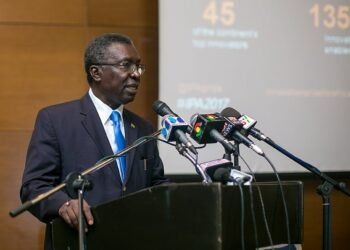Dr. Kwame Asiedu Sarpong, a distinguished Pharmacist, has strongly advocated for radical and urgent healthcare reforms in Ghana.
The D&D Fellow in Public Health at the Ghana Centre for Democratic Development (CDD-Ghana), in a detailed analysis, underscored the stark reality of the country’s health outcomes, framing it not merely as a medical challenge but as a significant impediment to economic development.
“A child born in Ghana today has an 87% chance of reaching age 20—but only a 5% chance of making it to 80. These figures are more than numbers. They are a stark reminder that while we’ve made progress in reducing childhood deaths, far too many Ghanaians still die prematurely”.
Dr Kwame Asiedu Sarpong, a Pharmacist and CDD-Ghana D&D Fellow in Public Health
Dr. Sarpong’s statistical revelations are particularly jarring, with the subsequent figures disclosing that only 70% of these children will live to see age 40, and less than half will make it to 60.
The most alarming statistic underscores the broader issue of longevity and quality of life: a mere 5% chance of making it to 80.
These are not just abstract numbers, Dr. Sarpong emphasised that they are a profound indicator of a system that, despite successes in early life interventions, fails to sustain health and well-being through adulthood and into old age.

He unequivocally states that this pervasive issue of premature mortality is not only a health crisis but a serious economic concern, directly impacting productivity and national development.
The most compelling aspect of Dr. Sarpong’s assessment is his assertion that this trajectory is not inevitable, highlighting that nearly 40% of all deaths in Ghana are, in fact, avoidable.
Healthcare Measures
This significant percentage represents lives that could be saved through a combination of proactive and reactive healthcare measures.
Among the crucial interventions he identified are robust preventive healthcare programs and regular screening, designed to detect and address health issues before they become critical.
Effective management of chronic illnesses, such as hypertension and diabetes, is also paramount, as these conditions, if unchecked, are major contributors to premature deaths.
Furthermore, improved sanitation and comprehensive vaccination coverage are foundational elements of public health that can drastically reduce the burden of infectious diseases.
Finally, prompt access to quality care when illness strikes is a non-negotiable requirement for saving lives and preventing complications.
Calls for National Policy Action
Dr. Sarpong’s critique extended beyond clinical interventions to a more fundamental issue of national policy and perception.
He lamented that for too long, healthcare in Ghana has been treated as an “orphaned public service,” rather than being recognized as a central driver of economic growth.

This oversight, he argued, neglects the fundamental truth that a healthier population is inherently a more productive one. From this perspective, Dr Sarpong argued that investing in health is not merely a cost but a strategic imperative for national development.
This re-framing of healthcare expenditure from a drain on resources to an investment in human capital, according to the CDD-Ghana Fellow, is crucial for transforming the nation’s health outcomes and economic prospects.
To change this worrying trajectory, Dr. Sarpong advocated for a profound shift in mindset and policy. He proposed a multi-pronged approach that moves beyond the traditional focus on clinics and campaigns.
Firstly, Dr Sarpong called for a concerted effort to promote early health-seeking behaviour among the populace, encouraging individuals not to wait until illnesses become life-threatening before seeking medical attention.
Secondly, he called for strategic health and economic planning that fundamentally values long-term well-being as a national asset, integrating health considerations into broader economic development strategies.

Welfare of Healthcare Workers
Crucially, Dr. Sarpong dedicated significant attention to the welfare of Ghana’s health workforce, articulating a powerful connection between their well-being and the nation’s health outcomes.
“Today, our nurses are on strike—not because they don’t care, but because they are being failed. Low remuneration, delayed allowances, and poor working conditions have become the norm. We cannot build a healthier nation on the backs of demotivated, overworked and underpaid professionals.”
Dr Kwame Asiedu Sarpong, a Pharmacist and CDD-Ghana D&D Fellow in Public Health
In conclusion, Dr. Sarpong outlined four critical actions required to ensure that Ghana’s children not only live long lives but also “long, healthy, meaningful lives.”
These are: a substantial investment in health, a comprehensive reform of health financing mechanisms, and a resolute prioritisation of workforce welfare.
Others include a fundamental re-integration of health as a key component of the national economic agenda, rather than viewing it as a mere drain on national resources.
READ ALSO: AngloGold Ashanti Reaffirms Commitment to Community Benefit























